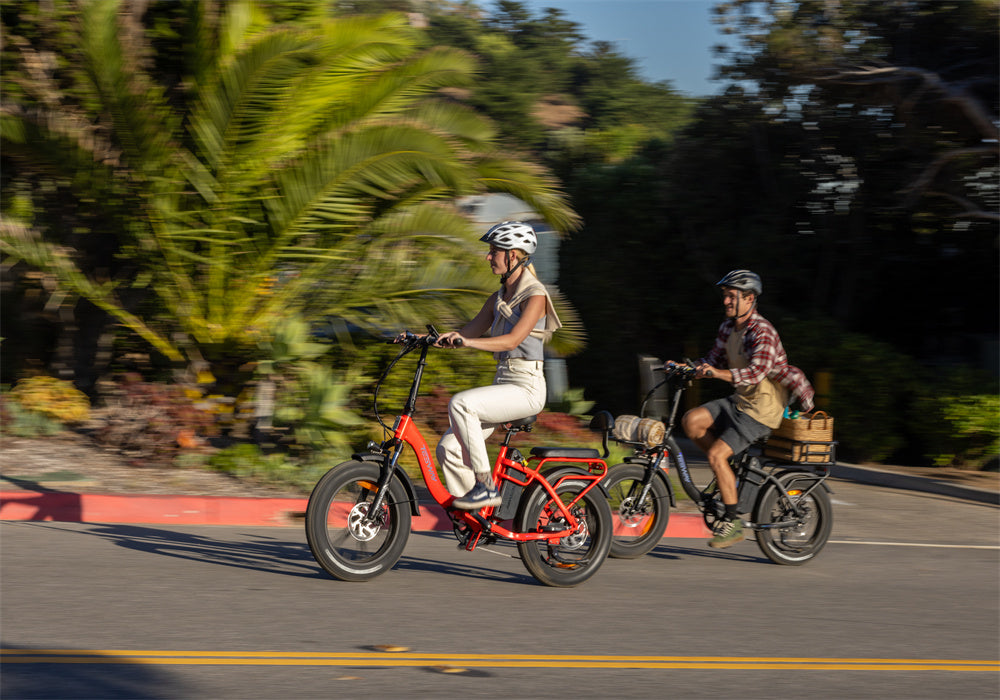Electric bicycles, have emerged as a viable and innovative solution for addressing a variety of contemporary transportation challenges. As more consumers become environmentally conscious and economically savvy, e-bike manufacturers are keen to promote the multitude of benefits these bikes offer. While the advantages—such as enhanced fitness, lower emissions, and considerable cost savings—vary depending on individual lifestyles, it's the financial savings that often ignite consumer interest.
Detailed Cost Savings Analysis
The transition from traditional automobiles to e-bikes can lead to substantial financial benefits over time. This concept is illustrated through the experience of Bryn Grunwald, a professional at the Rocky Mountain Institute in Colorado, whose journey with her Juiced CrossCurrent electric bike has been thoroughly documented by Cleantechnica. Since 2018, Bryn and her partner have accumulated more than 11,500 miles on their e-bike, offering a detailed look into the economic advantages of e-bike usage.

Initial Investment and Recurring Costs
The cost disparity between purchasing an e-bike and a car is stark, with e-bikes often costing a mere fraction of a car's price, thereby presenting an economically attractive alternative right from the outset. For instance, a high-quality e-bike might range from $1,000 to $3,000, whereas a modest new car can easily command $20,000 or more.
- Charging Costs: Bryn's e-bike features a 624 Watt-hour battery with an estimated range of 35 miles per charge, equating to about 0.0178 kilowatt-hours per mile. With electricity prices averaging 15 cents per kilowatt-hour, she calculated her total expenditure on charging for 11,500 miles to be approximately $30.71 USD. This starkly contrasts with the fuel costs associated with gasoline-powered vehicles.

Maintenance Cost Comparisons
A report by the National Association of City Transportation Officials suggests that the average annual maintenance cost for a car can exceed $1,000, primarily due to more complex mechanical components and higher labor costs. In contrast, the simplicity of e-bike components often results in significantly lower maintenance costs, usually not exceeding $200 per year.
According to Bryn, the maintenance of her e-bike includes periodic servicing and the occasional replacement of consumables like brake pads and tires. These expenses are significantly lower than those associated with car maintenance, which can include costly parts and labor for engine work, oil changes, and other mechanical repairs.

Fuel Efficiency and Cost Savings
According to a study conducted by the Transportation Research Board, e-bike users experience average energy efficiency of 8-10 miles per kilowatt-hour, which can translate to substantial savings in energy costs. For comparison, the average passenger vehicle in the U.S. achieves about 0.3-0.4 miles per kilowatt-hour, based on data from the U.S. Department of Energy. When applied to the real-life example of Bryn Grunwald:
- Total Energy Consumption: If Bryn had driven a car for the same 11,500 miles, assuming an average efficiency of 25 miles per gallon and a gas price of $3.50 per gallon, she would have spent approximately $1,610 on fuel alone. In contrast, her total cost for charging her e-bike was only about $30.71.
- Comparison: This represents a significant saving of approximately $1,579, showcasing the e-bike’s superior energy efficiency and cost-effectiveness.

Additional Financial Benefits
E-bike ownership extends beyond direct operational savings, offering several financial incentives that enhance overall cost efficiency:
- Insurance and Registration: E-bike owners typically enjoy the absence of the hefty insurance premiums and registration fees that are obligatory for car owners. These costs can add up to hundreds or even thousands of dollars annually for car owners.
- Depreciation: The rate of depreciation for e-bikes is considerably slower than that for cars, preserving more of their initial value over time. Cars, on the other hand, can lose a significant portion of their value within just a few years of ownership, affecting their long-term economic return.

Enhanced Lifestyle and Mobility
The practicality and flexibility offered by e-bikes are particularly beneficial in urban environments where traffic congestion and parking difficulties can be significant stressors. E-bikes enable riders like Bryn to bypass congested routes, utilize bike lanes, and enjoy the ease of parking that comes with a smaller, more agile vehicle. This enhanced mobility can lead to increased daily productivity and a more relaxed, enjoyable commuting experience. Like TESWAY S5 Pro, equipped with a powerful 750W motor, can travel 100miles on a single charge, while the S5 Pro is also a foldable electric since the car, very space-saving.
Reducing Carbon Footprint and Tackling Climate Change
E-bikes represent a significant step forward in reducing greenhouse gas emissions. The European Cyclists’ Federation found that e-bikes emit on average about 22 grams of CO2 per kilometer, a stark contrast to the 271 grams per kilometer emitted by a typical passenger car. This substantial reduction in emissions is crucial as urban areas continue to grow and seek solutions to air quality and climate change.
Find your best savings on travel at TESWAY! Follow TESWAY and you will not miss any deals!
FAQs
Are there additional financial benefits to owning an e-bike?
Yes, besides lower fuel and maintenance costs, e-bike owners typically do not face high insurance premiums and registration fees that car owners must pay. E-bikes also depreciate slower than cars, preserving more of their initial value over time.
How do e-bikes contribute to reducing traffic congestion and parking problems?
E-bikes are more agile and can bypass congested routes, utilize bike lanes, and easily find parking spots, making them particularly advantageous in urban settings. This not only saves time but also reduces the stress associated with commuting.
What is the environmental impact of using an e-bike compared to a car?
E-bikes emit significantly fewer greenhouse gases, about 22 grams of CO2 per kilometer, compared to 271 grams per kilometer for a typical passenger car. This makes e-bikes a more environmentally friendly option, helping to tackle climate change and improve urban air quality.







Share:
How E-bikes Can Help Beat Cardiovascular Disease
About 500W motors ebike – everything you need to know